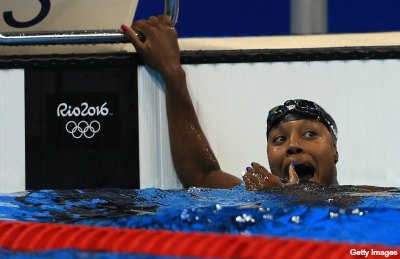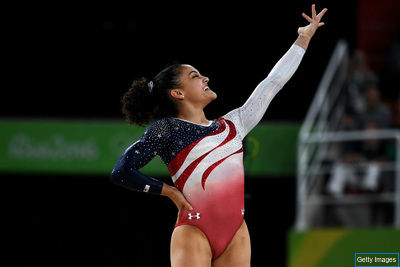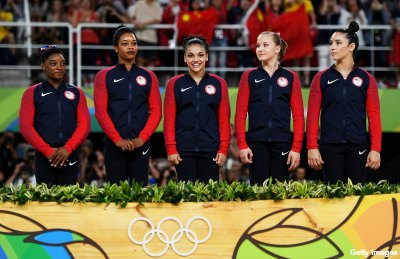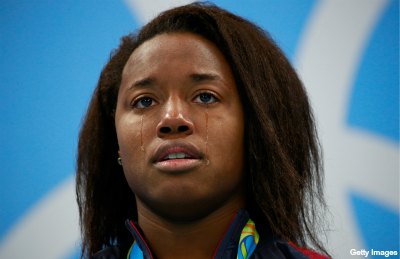Simone Manuel's words speak for themselves.
"I have felt like quitting," said Manuel. "I always had an issue with not seeing 'people that looked like me' in the sport. My parents and my coaches were always encouraging and kept me going."
Manuel made those comments to The Huffington Post in May, months before she made history as the first African-American woman to win an individual medal at the Olympic Games -- gold, no less. By winning, the young swimmer did much more write her name in the history books.

For young black swimmers, Manuel is now that person who looks like them -- a hero in whose mold their aspirations can be modeled. And at the 2016 Summer Olympic Games, that is quickly becoming a prominent narrative for Team USA. With the world watching, athletes from the United States are standing tall as shining examples of the American Dream fulfilled -- emblems of the diversity America has long sought to represent.
Before Manuel's performance Thursday night, the American women's gymnastics team made a profound statement on an international stage. Its dominant team win earlier in the week was impressive not just for its margin of victory, which staked a claim for the "Final Five" as perhaps the best team in women's gymnastics history. Four years after Gabby Douglas became the first African-American to win individual gold in Olympics gymnastics, America returned with a squad that was as dominant as any the sport has ever seen.
It was also the makeup of that team -- which features an African-American, a Jewish-American, a Puerto Rican-American and a Belizean-American with dual citizenship, and is managed by a Hungarian-Romanian immigrant -- that elevated its cultural importance.

While tense race relations and xenophobia continued to strain the fabrics of communities back in the states, Team USA's women's gymnastics team collected gold. The team, as well as individual standouts Simone Biles and Aly Raisman, rank among the greatest stories to come from the first week of Olympic competition.
Their talent and performances are undeniable -- particularly after Biles won all-around gold by a landslide, while Raisman atoned for a fourth-place finish in 2012 to take silver in 2016. But the weight of their achievements is amplified by the social progress they represent.
They've already done the hard work, which is overcoming personal obstacles alongside the sheer unlikelihood of reaching the Olympics in the first place. And for their efforts, their country has been rewarded, and not just with a haul of medals. Already, these Olympic Games have given us a handful of new minority athletes to hold up as role models and inspirational figures.

It goes beyond the historic achievements of Raisman and Biles. Consider Lauren Hernandez, only the third Latin-American gymnast to reach the Olympic Games, and the first since 1984. These athletes are filling roles that have seldom been occupied by minorities, if ever. It goes back to what Simone Manuel said: When she was growing up, there weren't other swimmers who looked like her.
Now there are.
But the significance of an accomplishment like Manuel's is even more stark when placed into a cultural context. Consider the historical disadvantage created when generations of black Americans were banned from public beaches and pools before the Civil Rights Act. That continues to have an impact on the world we live in today as USA Swimming notes, 70 percent of African-American children have limited or no swimming abilities.
Stats from the CDC are even more alarming: Blacks under 30 years of age are 1.4 times more likely to drown than their white counterparts. Among children ages 5 to 19, blacks are a staggering 5.5 times more likely than whites to drown in a public swimming pool.

If you're an 11- or 12-year-old African-American child, you are 10 times more likely to drown than a white kid of the same age. So it makes sense why Manuel has a very practical desire for her influence on younger generations.
"There aren't that many black people in the sport because I think people gravitate towards the norm," she tells The Huffington post. "Stereotypically, black people participate in basketball, volleyball, football, and track. The best thing that can be done to encourage blacks to swim is to get kids started early.
"They might develop a love for the sport, but the most important issue for me is that all minorities need to be water safe and not be afraid of the water."
So yes, Manuel is an American success story, one who will rightly be remembered for years to come. But she also represents a dream yet unfulfilled for millions of Americans, and millions more around the world, who see her and see hope.
Ultimately, the successes of Manuel, Biles and other minority Olympians bear significance stretching well beyond the scope of sports. They represent both an America Dream fulfilled, and a larger one still in the making.
More Olympics:
-- 5 Weirdest Jobs At This Year's Olympics
-- We Never Understood How Great Ryan Lochte Was
-- Michael Phelps' 20th Gold Medal Is His Most Emotional





